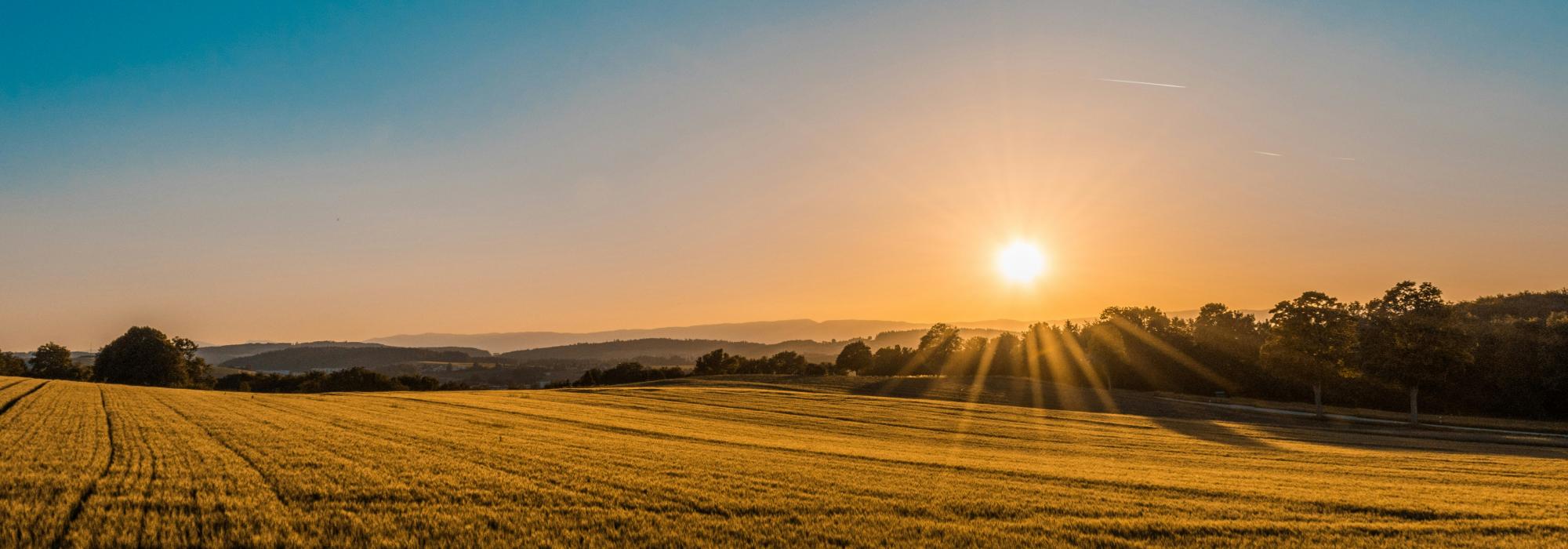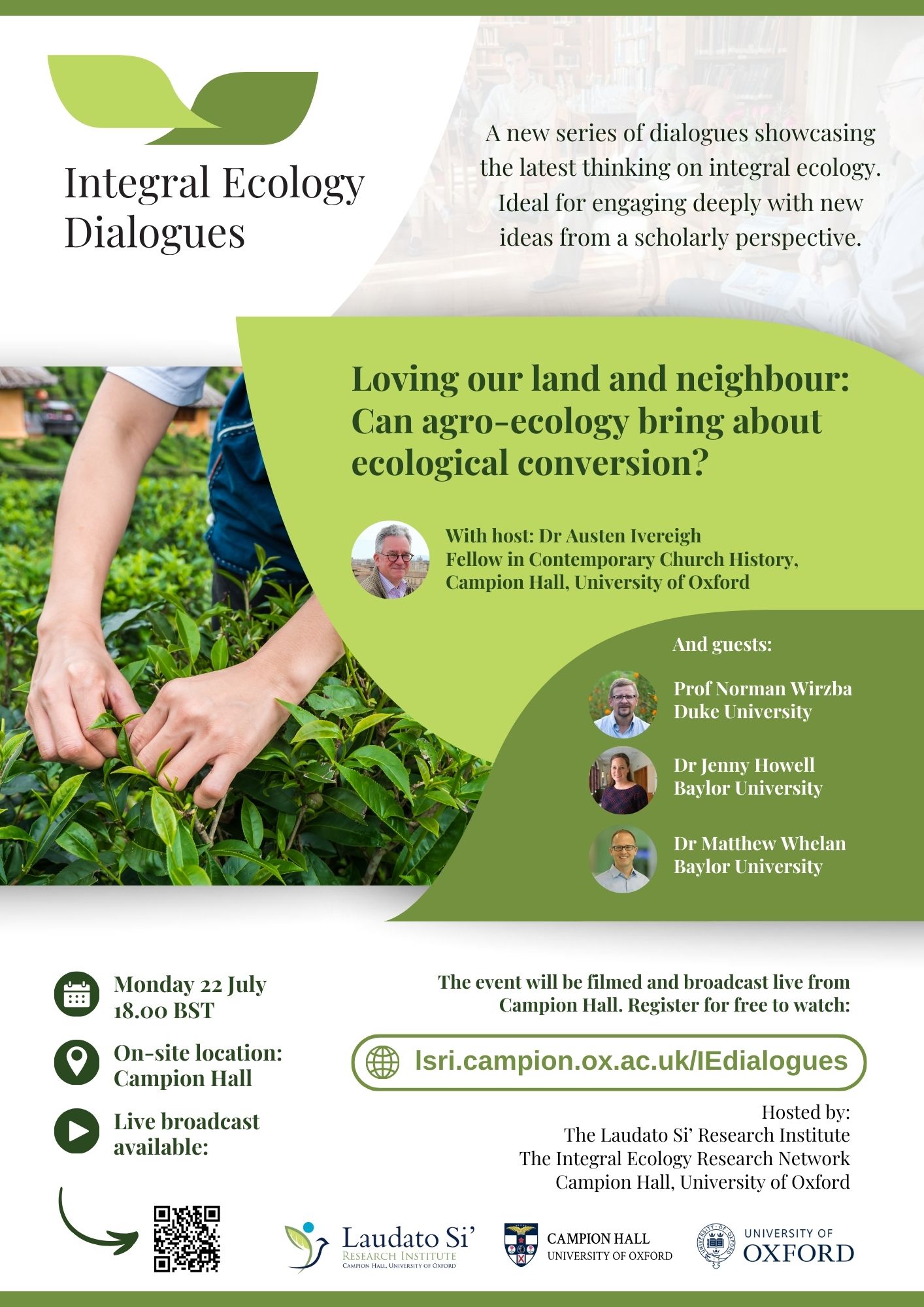
Loving Our Land and Neighbour: Can Agro-Ecology Bring About Ecological Conversion?
Key Details
A conversation on agro-ecology: Monday 22 July, 18.00-18.50 BST
This event will comprise a moderated dialogue on the subject of agriculture and land use, from the perspective of Catholic theology and integral ecology.
The dialogue will be hosted by Dr Austen Ivereigh. Fellow in Contemporary Church History, Campion Hall, University of Oxford; also Catholic journalist, author and biographer of Pope Francis.
Speakers:
- Professor Norman Wirzba. Gilbert T. Rowe Distinguished Professor of Christian Theology; Senior Fellow at the Kenan Institute for Ethics; Director of Research for the Office of Climate and Sustainability, Duke University.
- Dr Jenny Howell. Director of the Theology, Ecology, and Food Justice Program, George W. Truett Theological Seminary, Baylor University.
- Dr Matthew Whelan. Assistant Professor of Moral Theology and Social Ethics, Baylor University.
The dialogue will be broadcast live from Campion Hall, University of Oxford, with a small in-person audience.
You are invited to register for free to watch the online livestream: here.
We are grateful to Baylor University, Texas, for their support for this event.

-
Host biography
Austen Ivereigh is a writer, commentator and speaker on contemporary church affairs, and a Fellow in Contemporary Church History at Campion Hall, Oxford. He is known above all for his writings on, and with, Pope Francis. He drew on his D.Phil. from St Antony’s College, Oxford, in 1993 — published as Catholicism and Politics in Argentina, 1810-1960 (MacMillan 1994) — for his biography of Pope Francis, The Great Reformer: Francis and the Making of a Radical Pope (Allen & Unwin, 2015), which has been translated into many languages. This was followed in 2019 by a second book on the Francis pontificate: Wounded Shepherd: Pope Francis and the Struggle to Convert the Catholic Church (Henry Holt, 2019).
The following year he curated Pope Francis’s Covid reflections, Let Us Dream: The Path to a Better Future. In Conversation with Austen Ivereigh (Simon & Schuster, 2020) which was a New York Times bestseller. Recently he published First Belong to God: On Retreat with Pope Francis (Loyola Press / Messenger Publications, 2024), an eight-day Ignatian retreat that draws on Francis’s teachings and writings.
In 2019, Dr Ivereigh moved with his wife to a small farm in Herefordshire, where he practises small-scale regenerative horticuture. His reflections on ecological conversion appear in a regular column in The Tablet, called ‘Wild Faith’.
Since 2021, he has been closely involved in the global Catholic synod on synodality as a theological expert, and will be at the concluding assembly in Rome this October.
-
Guest speaker biographies
Professor Norman Wirzba
Norman Wirzba is the Gilbert T. Rowe Distinguished Professor of Christian Theology, Director of Research for Climate and Sustainability, and Senior Fellow at the Kenan Institute for Ethics at Duke University. Raised on a farm in Southern Alberta, Norman went on to study history at the University of Lethbridge, theology at Yale University Divinity School, and philosophy at Loyola University Chicago. His current work focuses on understanding and promoting practices that can equip both rural and urban church communities to be more faithful and responsible members of creation. Norman serves as general editor for the book series Culture of the Land: A Series in the New Agrarianism, published by the University Press of Kentucky, and is co-founder and executive committee member of the Society for Continental Philosophy and Theology. Recent publications include the 2011 Food and Faith: A Theology of Eating, published in a second edition with Cambridge University Press in 2019, Way of Love: Recovering the Heart of Christianity (HarperOne, 2016), This Sacred Life: Humanity’s Place in a Wounded World (2021, Cambridge University Press, 2021), and Agrarian Spirit: Cultivating Faith, Community, and the Land (Notre Dame Press, 2022). Norman serves as general editor for the book series Culture of the Land: A Series in the New Agrarianism, published by the University Press of Kentucky.
Norman pursues research and teaching interests at the intersections of theology, philosophy, ecology, and agrarian and environmental studies. In particular, his research is centred on a recovery of the doctrine of creation and a restatement of humanity in terms of its creaturely life. He is currently the director of a multi-year, Henry Luce-Foundation-funded projected entitled “Facing the Anthropocene.” In this project, housed at Duke’s Kenan Institute for Ethics, he is working with an international team of scholars to rethink several academic disciplines in light of challenges like climate change, food insecurity, biotechnology and genetic engineering, artificial intelligence, species extinction, and the built environment.
Dr Jenny Howell
Jenny Howell serves as the director of the Theology, Ecology, and Food Justice Program at Baylor University's Truett Seminary. After earning a BA from the Honor's Program at Texas A&M University, Jenny went on to receive her MDiv (Duke Divinity School) and PhD in Theology and Ethics (Baylor University). Her scholarship focuses on the doctrine of creation. Jenny also serves as the Theologian in Residence at the World Hunger Relief Farm, where all her classes are offered. She believes that teaching her courses on site at a flourishing regenerative farm allows seminary students the opportunity to more fully integrate the rigor of theological education with an informed love of place that Christians are called to tend and nurture.
Dr Matthew Whelan
Matthew Philipp Whelan is Assistant Professor of Moral Theology and Social Ethics in the Honors Program at Baylor University, where his research centres on Catholic social teaching, Latin American and liberation theologies, and ecological theology and ethics.
He is the author of the award-winning book, Blood in the Fields: Óscar Romero, Catholic Social Teaching, and Land Reform (Catholic University of America Press, 2020), which argues that Romero’s advocacy for justice in the distribution of land—a commitment with deep roots in the Christian tradition and preserved in Catholic social teaching—illumines the meaning of his witness, along with that of other land and environmental defenders today. He is currently at work on two additional book projects: the first, Christianity and Agroecology (forthcoming with Cambridge University Press), draws upon agroecology, a transdisciplinary science integrating ecological principles into agriculture, to deepen and concretize Christian ethical commitment. The second, Poverty, Luxury, and Art (co-authored with Natalie Carnes), asks how Christians faithfully negotiate the excesses of art in a world of need.
Matthew’s scholarship is informed by his years working with farming communities in Central America. He is a gardener and composter, and he and his wife Natalie have three daughters.

